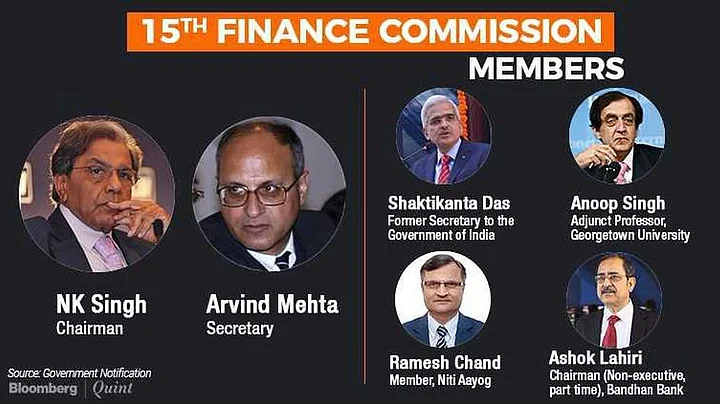The 15th Finance Commission, which the government notified on 27 November 2017, will have to first contend with the slowdown in the Indian economy.
There is an upward trend in the fiscal deficits of states. The inter-governmental transfer system has become overly complex with different sharing arrangements for different taxes; the spending autonomy of the states, combined with their ability to borrow, has obstructed efforts at consolidating public finances; there is little incentive for states to improve revenue performances and revenue-sharing arrangements have led to pro-cyclical policies at the state level.
The high levels of inter-governmental transfers necessitate that states ensure that provincial tax enforcement and structural reforms are strengthened. The problem with persistent off-budget spending has proved a drag on the fiscal deficits of the states.
The Vertical Balances
The vertical balances to the states relative to the Centre’s gross revenue receipts have shown trend increases in every Finance Commission and it would not be possible to reduce the devolution without a corresponding increase in fiscal and revenue deficits of the states.
The higher devolution under the 14th Finance Commission have seen marginal increases in social sector allocations.
There are pressures to increase allocations to the centrally sponsored schemes (CSS) for higher expenditure on health and education. The tax buoyancies have been affected by the transition to the goods and services tax (GST) and the GST compensation to states will continue till 2022.
For the 15th Finance Commission, GST will usher in higher tax buoyancy by bringing in a large number of new tax payers into the net. Higher tax collections under GST will provide the Union government room for fiscal manoeuvre to finance the inter-governmental transfer system.
The Horizontal Balances
On the horizontal balances, the 15th Finance Commission has the responsibility of equalising the widening gap between richer states and the low-income states. These inequalities have resulted in widely differing social and capital expenditure between the states. A large part of the equalisation effort by the 15th Finance Commission would have to be through grants-in-aid rather than devolution.
The 14th Finance Commission's recommendations ushered in a new era of fiscal federalism in India. Devolution to the states significantly went up from 32 percent to 42 percent.
While most countries have found it difficult to finance federal transfers of about 30 percent to the provinces, India has taken it to 42 percent.
The government followed up the historic devolution with the constitution of the NITI Aayog to promote cooperative federalism and enacted a constitutional amendment to establish the GST Council.
These major progressive steps were backed by restructuring the CSS allocation ratio from 75:25 to 50:50 to provide greater flexibility and ownership to the states. In turn, the states were mandated to pursue the objectives of zero revenue deficit, fiscal deficit not exceeding 3 percent of GSDP, interest payments-to-revenue receipt ratio not exceeding 10 per cent and debt-to-GSDP ratio not exceeding 25 percent.
Despite these historic steps, there remain challenges. The resource requirements of the power sector remain very high. In some states, the fiscal deficit with power sector allocations have climbed to around 9 percent.
The deteriorating public debt dynamics caused by the requirements of the power sector’s restructuring would be a major area of concern for the 15th Finance Commission.
An alternate fiscal scenario would need to be considered to limit the on-budget fiscal deficits to 3 percent by including the power sector.
Then, a debt-to-GSDP ratio of 25 percent greatly limits the government’s borrowing needs and has the potential to curtail social sector expenditure.
The NITI Aayog has pointed out that social sector expenditure has increased only marginally since the 14th Finance Commission despite an increase in total central transfers to the states by 21.9 percent.
The 14th Finance Commission assessed state finances as (a) for states with above-average tax-GSDP ratio the assumed tax buoyancy was 1.05, implying a moderate increase and (b) for other states, a higher buoyancy of 1.5 was assumed. An increase in aggregate tax-GSDP ratio from 8.26 of GSDP to 9 percent in the terminal year was assumed.
The Expenditure
On the expenditure side, the 14th Finance Commission included the expenditure incurred on CSS in revenue expenditure. The expenditure was projected as 11.12 percent of GDP against 13.57 percent projected by the states.
In sum, the 15th Finance Commission will review the current status of the finance, deficit, debt levels, cash balances and fiscal discipline efforts of the Union and the states and recommend a fiscal consolidation roadmap for sound fiscal management, taking into account the responsibilities of the central and state governments. The Commission may also examine whether revenue deficit grants be provided at all.
The best way forward would be to adhere to the letter and spirit of the Constitution by balancing the Union and state's revenue powers with expenditure responsibilities listed in the 7th schedule of the Constitution, appreciate the problems raised by stakeholders, and attempt to address the contemporary issues relevant to the terms of reference.
(V Srinivas, an IAS officer, is chairman Rajasthan Tax Board and holds additional charge of Chairman Rajasthan's Board of Revenue. The views expressed are personal. This article has been published in an arrangement with IANS.)
(Breathe In, Breathe Out: Are you finding it tough to breathe polluted air? Join hands with FIT in partnership with #MyRightToBreathe to find a solution to pollution. Send in your suggestions to fit@thequint.com or WhatsApp @ +919999008335)
